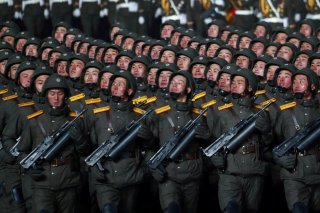More Vaccines Offered by COVAX to North Korea
It remains to be seen whether Pyongyang will accept them.
North Korea, since the start of the coronavirus pandemic, has claimed repeatedly to have zero coronavirus cases. But at the same time, reports of late have stated that North Korea seems to have no coronavirus vaccine strategy at all.
Voice of America (VOA) reported last week that UN-affiliated organization COVID-19 Vaccines Global Access (COVAX) had been scheduled to deliver 1.7 million doses of the AstraZeneca vaccine to North Korea in March, but that talks “stalled” with the Kim regime on those deliveries.
“If the [Democratic People’s Republic of Korea (DPRK)] had been swift with the paperwork, they would have gotten some vaccines. It’s hard to say how much, but if they complied with the request from [the Global Alliance for Vaccines (GAVI)] we would be well underway now,” a “source familiar with the talks” told VOA.
However, a new report says that North Korea may be in line to get more vaccines, also from COVAX.
According to NK News, which cited World Health Organization officials, COVAX has offered about three million doses of the Sinovac vaccine to North Korea, in addition to the 1.7 million AstraZeneca doses that remain in limbo.
The Korea Herald reported the same thing this week about the Sinovac shots. That report added that it “remains to be seen” whether the North Korean regime will accept the shots from COVAX.
“We are still waiting for the DPRK’s response to this offer,” Edwin Salvador, head of the World Health Organization office in Pyongyang, said, per Radio Free Asia. “DPRK has already developed the national vaccine deployment plan and a technical assistance plan for its rollout has also been developed.”
The Gavi Alliance has said that it is in talks with North Korea operating in the country.
The Sinovac vaccine, also known as the Sinovac-CoronaVac, was developed by the Chinese firm Sinovac Biotech.
“Vaccination is recommended for persons with comorbidities that have been identified as increasing the risk of severe COVID-19, including obesity, cardiovascular disease, and respiratory disease,” the World Health Organization says of the Sinovac vaccine on its website.
“The vaccine can be offered to people who have had COVID-19 in the past. Available data shows that symptomatic reinfection is unlikely in these persons for up to six months after natural infection. Consequently, they may choose to delay vaccination to nearer the end of this period, especially when vaccine supply is limited. In settings where variants of concerns with evidence of immune escape are circulating earlier immunization after infection may be advisable.”
According to Reuters, which cited the Lancet, the Sinovac vaccine has led to a higher risk of Bell's Palsy.
"The beneficial and protective effects of the inactivated COVID-19 vaccine far outweigh the risk of this generally self-limiting adverse event," the study said.
Stephen Silver, a technology writer for The National Interest, is a journalist, essayist, and film critic, who is also a contributor to The Philadelphia Inquirer, Philly Voice, Philadelphia Weekly, the Jewish Telegraphic Agency, Living Life Fearless, Backstage magazine, Broad Street Review and Splice Today. The co-founder of the Philadelphia Film Critics Circle, Stephen lives in suburban Philadelphia with his wife and two sons. Follow him on Twitter at @StephenSilver.
Image: Reuters

